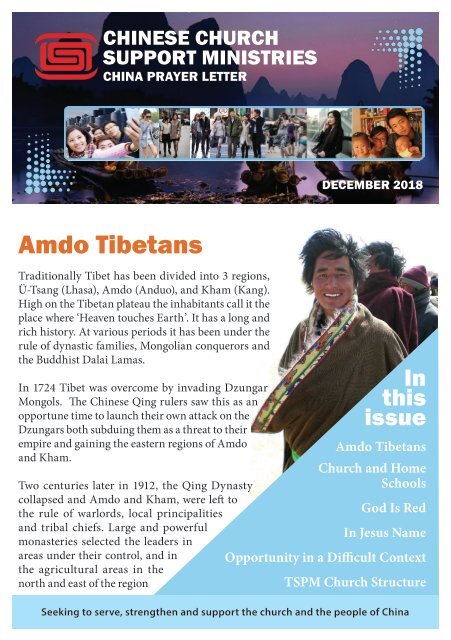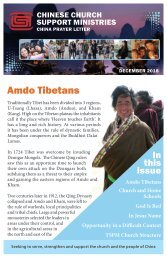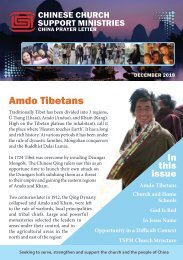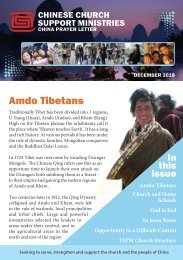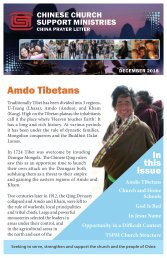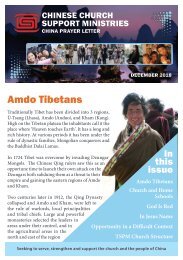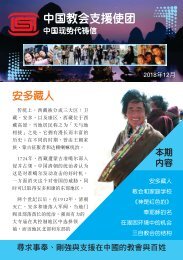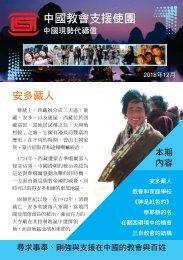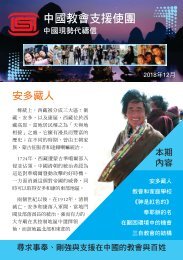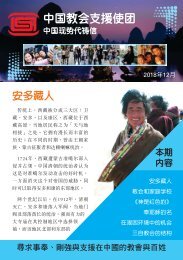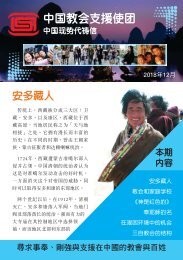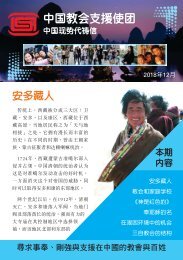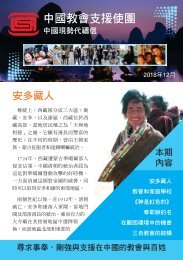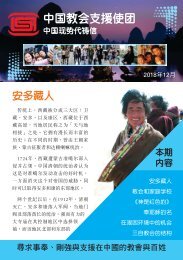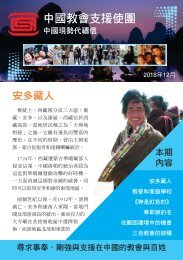PU_December2018_NZ_web
Create successful ePaper yourself
Turn your PDF publications into a flip-book with our unique Google optimized e-Paper software.
CHINESE CHURCH<br />
SUPPORT MINISTRIES<br />
CHINA PRAYER LETTER<br />
DECEMBER 2018<br />
Amdo Tibetans<br />
Traditionally Tibet has been divided into 3 regions,<br />
Ü-Tsang (Lhasa), Amdo (Anduo), and Kham (Kang).<br />
High on the Tibetan plateau the inhabitants call it the<br />
place where ‘Heaven touches Earth’. It has a long and<br />
rich history. At various periods it has been under the<br />
rule of dynastic families, Mongolian conquerors and<br />
the Buddhist Dalai Lamas.<br />
In 1724 Tibet was overcome by invading Dzungar<br />
Mongols. The Chinese Qing rulers saw this as an<br />
opportune time to launch their own attack on the<br />
Dzungars both subduing them as a threat to their<br />
empire and gaining the eastern regions of Amdo<br />
and Kham.<br />
Two centuries later in 1912, the Qing Dynasty<br />
collapsed and Amdo and Kham, were left to<br />
the rule of warlords, local principalities<br />
and tribal chiefs. Large and powerful<br />
monasteries selected the leaders in<br />
areas under their control, and in<br />
the agricultural areas in the<br />
north and east of the region<br />
In<br />
this<br />
issue<br />
Amdo Tibetans<br />
Church and Home<br />
Schools<br />
God Is Red<br />
In Jesus Name<br />
Opportunity in a Difficult Context<br />
TSPM Church Structure<br />
Seeking to serve, strengthen and support the church and the people of China
the Hui Muslims held power.<br />
Not all was peaceful. Bloody clashes<br />
took place between the Tibetans and Hui<br />
Muslim warlords.<br />
These warlords<br />
later sided with the<br />
Kuomintang in 1928.<br />
By 1952 the<br />
Communist Party<br />
of China forces had<br />
overpowered both<br />
the Kuomintang and<br />
the local Tibetans<br />
and had won control of the region.<br />
A revolt erupted among the fiercely<br />
independent Tibetans, beginning in<br />
Amdo in 1959, and led to tremendous loss<br />
of Tibetan lives and the bombarding of<br />
most of the monasteries. It was followed<br />
by a devastating famine.<br />
Today, Amdo has been largely<br />
incorporated into the Qinghai Province<br />
with pockets in the Gansu and Sichuan<br />
Provinces. An Amdo county remains in<br />
the Tibet Autonomous Region.<br />
What makes Amdo Tibetans distinct<br />
from other Tibetans is the language they<br />
speak, known as Amdolese. This is one of<br />
the four main spoken Tibetic languages,<br />
the other three being Central Tibetan,<br />
Khams Tibetan, and Ladakhi. Amdolese<br />
language is not a tonal language like<br />
Central and Khams Tibetan. In<br />
addition, there are many<br />
dialects within<br />
2<br />
Amdolese due to the geographical<br />
isolation of the many groups. However,<br />
all Tibetans use the same written script<br />
and can communicate by swapping notes.<br />
Across the different<br />
groups there around<br />
1.4 million Amdo<br />
speakers.<br />
Mostly living outside<br />
the cities, the Amdo<br />
Tibetans are generally<br />
semi-nomadic<br />
herders and farmers.<br />
They are devoted<br />
followers of Tibetan Buddhism but mix<br />
it with the Bon religion and its multitude<br />
of divinities, rites and rituals. Dance plays<br />
a large part in their celebrations.<br />
Amdo Tibetans have been described as<br />
intelligent people who require reasoning<br />
rather than instruction. According to the<br />
Joshua Project several mission agencies<br />
worked in the Amdo area prior to 1949<br />
and at least five small churches consisting<br />
of Amdo Tibetans remain today. Even so,<br />
more than 95% of the Amdo Tibetans<br />
have never heard the gospel message.<br />
When they do come to believe, standing<br />
for Christ will take courage as they are<br />
likely to be disowned by their family.<br />
The handful of believers working with<br />
the Amdo Tibetans are precious to the<br />
Kingdom as many people baulk at living<br />
in the region due to the food, the remote<br />
areas and the arid and cold climate. In<br />
addition, during periods of conflict,<br />
sensitive regions have been closed off to<br />
visitors.
In recent years there has been a migration<br />
of young people from the villages to the cities<br />
for education and better work prospects.<br />
Here there is the possibility they may meet<br />
Christians and hear the Good News.<br />
Church and Home<br />
Schools<br />
Registered schools in China can be either<br />
public or private. Private schools require<br />
the parents to pay tuition fees and other<br />
fees required by the school. Public schools<br />
may be fully or partly subsidized by the<br />
government.<br />
Back in the 1990s China began to see<br />
the upsurge of home schooling. It was<br />
in the face of China’s 1986 Compulsory<br />
Education Law which stipulates nine<br />
years of education for all children at<br />
International<br />
Short-Term<br />
Teams<br />
*<br />
registered schools. But for a time, official<br />
oversight and legal loopholes allowed<br />
parents to opt out of the mainstream<br />
school system.<br />
While they enjoyed this relaxed<br />
atmosphere Church’s and private<br />
coalitions began to facilitate<br />
kindergartens and even schools. The<br />
children’s tutors were directly hired by<br />
their parents thereby these places could<br />
not technically be considered educational<br />
**<br />
Mercy<br />
**<br />
Medical<br />
* Intercession<br />
**<br />
Trekking<br />
**<br />
English Cultural Exchange<br />
December 2018:<br />
April 2019:<br />
Cultural Exchange Team<br />
Cultural Exchange; Cycle/Intercession; Mercy;<br />
Medical; Come, See & Do Youth Leaders Teams<br />
3
organisations.<br />
Even though the schools were<br />
unregistered, the landlords and state<br />
authorities generally turned a blind eye<br />
as long as there were no complaints.<br />
Parents chose to avoid state registered<br />
schools for a variety of reasons...<br />
Migrant workers who wanted their<br />
children to travel with them to cities<br />
away from their designated home town<br />
paid hefty subsidies for their children’s<br />
education at state schools. In addition,<br />
these rural children often experienced<br />
bullying and prejudice at urban schools.<br />
The incentive for a great many to look<br />
for alternative education systems was<br />
the intense pressure placed on students<br />
to achieve in state schools. For others it<br />
was to give their children an education<br />
more focused on critical, independent<br />
thinking, innovation and team work.<br />
For Christians, generally, it includes a<br />
desire to have their children to grow up<br />
with a Christian worldview and without<br />
indoctrination of atheist curriculums.<br />
By 2014 Chinese Churches in the north,<br />
northeast, south-eastern coastal area,<br />
southern area and even in the central<br />
region were starting schools. In the large<br />
cities and throughout the provinces<br />
of Zhejiang and Henan, churches were<br />
running Christian schools. Between 300<br />
to 500 schools were estimated to be in<br />
operation.<br />
4<br />
However, graduates from these<br />
schools missed out on the certificate<br />
issued by registered schools - required<br />
for those preparing to sit national<br />
university entrance examinations, or<br />
the gaokao. Internationally recognised<br />
homeschool systems, such as ACE, could<br />
give a student the qualifications needed to<br />
apply to foreign universities – but costs to<br />
study overseas are very high and a good<br />
level of language learning is required.<br />
Neither are online college degrees a good<br />
option for further education as they are<br />
not thought highly of in China with its<br />
highly competitive job market.<br />
Now the government has sent clear<br />
message…It will no longer turn a blind<br />
eye to children that have not entered<br />
the state education system. The period<br />
of leniency has apparently ended. In<br />
February 2017 the Government released<br />
a policy stating “[Students] should not<br />
be allowed to study at home to replace<br />
the national unified implementation of<br />
compulsory education.” Applications<br />
to be excluded from this compulsory<br />
education will require special permission<br />
and will likely only be granted in cases<br />
where health is an excuse.<br />
This builds on the 2013 guidelines<br />
that "core socialist values" should be<br />
incorporated into the national curriculum<br />
and "cover all schools and those receiving<br />
education".<br />
Already reports have come in of Church<br />
schools and kindergartens being shut<br />
down. Unregistered schools are no longer<br />
being overlooked and the rapid rise of the<br />
homeschool movement seems to have<br />
come to an abrupt halt.
God is Red<br />
– A Book Review<br />
The Secret Story of How Christianity Survived and<br />
Flourished in Communist China<br />
By Liao Yiwu, (also known as Liao Wei), a Sichuan born<br />
Chinese who has spent time in prison for his works as a writer,<br />
and whose books have been banned in China. Many of his books<br />
include interviews with people from the lower ranks of Chinese<br />
society who have suffered injustice and endured hardship under<br />
government policies. He is a prolific writer, and a musician and<br />
poet. He is openly critical of the Chinese communist regime. Liao<br />
made a dramatic escape from China and now travels between<br />
the USA and Germany, where he has won awards for his works.<br />
Please note that CCSM is not a political organisation. Yet we<br />
feel this book brings valuable and timely insights to Chinese Christianity and is a worthy inclusion in the<br />
Prayer Letter. It tells real and untold stories that recite church history and suffering in China leaving the<br />
reader with a better understanding of what it is like to go through persecution.<br />
God is Red, begins with a series of<br />
interviews and accounts through which<br />
Liao investigates Christianity in Yunnan<br />
Province. He is introduced to contacts<br />
who recall the lives of the foreign<br />
missionaries who first came to the area.<br />
Local Christians tell of the missionary’s<br />
selfless acts of service in sharing the<br />
gospel and caring for the people,<br />
including occasions where numerous<br />
lives in remote areas were saved by their<br />
medical assistance during pandemics.<br />
Liao is fascinated by the strength of faith<br />
in the stories he hears.<br />
He travels with a Chinese doctor who<br />
gave up wealth and status to serve Christ<br />
in remote villages. He shares with the<br />
reader discussions with real people whose<br />
lives were changed by encounters with the<br />
Lord.<br />
documents the treatment of Christians<br />
during the Cultural Revolution. ‘God is<br />
Red’ is a precious recount of the stories<br />
of those who bravely gave up their lives<br />
during the Mao era rather than denounce<br />
their beliefs. As he starts to write about<br />
Yunnan’s mountain men of faith, he<br />
begins his preface with the words, “Every<br />
inch of soil beneath my feet was red,<br />
shining under the frail winter sun, as if<br />
it had been soaked with blood”.<br />
Captivating conversations reveal the heart<br />
and soul of Christians across Yunnan’s<br />
rich mix of cultures and people groups.<br />
He talks with local Han and Bai, Miao<br />
and Yi minority peoples. He is introduced<br />
to Tibetan catholic monks, Han house<br />
fellowships and protestant churchgoers.<br />
His travels span from the city of Dali to<br />
the very “belly button” of the remotest<br />
mountains.<br />
In meetings with the relatives he<br />
Further into the book he then<br />
5
enlarges his study of Christianity to<br />
Beijing and Chengdu, meeting and<br />
exploring how Christianity has affected<br />
the lives of old and new believers there.<br />
What is particularly intriguing about this<br />
book is that Liao does not have a faith in<br />
Jesus. So his examination of Christianity<br />
is from a truly indigenous, non-Christian<br />
perspective.<br />
First penned in 2011, God is Red is<br />
not hot off the press. But it remains a<br />
recommended read for those interested<br />
in learning more about the circumstances<br />
and experiences which have shaped and<br />
continue to shape the Chinese church of<br />
today.<br />
What does intercession mean to you? Is<br />
it something only the older people in the<br />
church can do? Does it mean long and<br />
arduous prayers? Climbing mountains<br />
to pray at the top? That sure sounds<br />
like hard work! So perhaps with these<br />
stereotypes it’s not surprising that of the<br />
various trips that CCSM arranges into<br />
China, Intercession has the least people<br />
signing up. But for those that have gone<br />
it is often said to be the most rewarding.<br />
6<br />
In Jesus Name<br />
The Intercession Team this year<br />
was very multi-cultural with<br />
members from New Zealand,<br />
Malaysia, Hong Kong, England<br />
and also a Chinese national.<br />
Romans 8:34 says that Jesus<br />
himself “is at the right hand of<br />
God and is also interceding for<br />
us.” In the Bible the same word<br />
translated as “intercession” is in<br />
other places also translated as<br />
“they met together”. The wellknown<br />
Bible teacher Derek Prince<br />
describes intercession as “to come<br />
between God and those who deserve<br />
God’s judgment”.<br />
The pulling down of spiritual strongholds<br />
through prayer is another area of<br />
intercession. Numerous people remain<br />
in spiritual bondage in China.<br />
Although the Chinese church has<br />
experienced rapid growth in recent years,<br />
the work of the Great Commission in<br />
China is a long way from being complete.<br />
There are so many communities, cities
PRAYER POINTERS<br />
Amdo Tibetans<br />
Pray for opportunities for Amdo Tibetans to hear about a loving Saviour<br />
and that they will respond with open hearts.<br />
Pray that this region will continue to enjoy a period of peace so that it<br />
can remain open. Pray that the Amdo Tibetans may truly find hope and<br />
peace in the One True God.<br />
Cut out this note and slip it into your Bible to help you remember the December prayer topics for China<br />
Thank God for the Amdo Tibetans who have accepted Christ. Pray that<br />
they will be kept safe and that they will be bold in sharing the message<br />
to their people.<br />
Church and Home Schools<br />
Pray that parents can teach their children Christian truth and values<br />
and that they will be able to hold on to them despite peer pressure and<br />
propaganda.<br />
Thank God that he gives us his Holy Spirit to all who ask for it young<br />
and old, to “guide you into all truth”.<br />
Pray for the teachers, parents and children who have had to leave the<br />
Church Schools and return to the state school curriculum.<br />
God Is Red<br />
Thank God that he has used this writer, Liao Yiwu, to record the stories<br />
of believers in China.<br />
Thank God for the encouragement these stories are to other workers<br />
and intercessors. Often the fruit of their labour is not seen till years later.<br />
Praise God for his ability to transform the lives of individuals and even<br />
whole communities.<br />
Thank God for the people who obediently carried his message to difficult<br />
and remote places<br />
7
In Jesus Name<br />
Thank God for the Intercessors and prayer warriors who intercede for the<br />
unreached people of China.<br />
Pray that the Father will increase the passion of the Church to obey the<br />
Great Commission.<br />
Thank God for the opportunities the latest team was given to pray in strategic<br />
locations.<br />
Pray for the seeds that have been sown. Pray that they will be watered and<br />
will take root and grow.<br />
Opportunity in a Difficult Context<br />
PRAYER POINTERS<br />
Pray that trusting friendships will quickly develop and grow between foreign<br />
workers and students and will continue even after the workers return back<br />
to their homelands.<br />
Ask God to help Christians provide personal support and pastoral care for<br />
Chinese students who endure tremendous pressure to work long hours.<br />
Give thanks for the few workers who have stayed longer term in more remote<br />
regions. Pray that they will quickly develop their language skills and be<br />
effective in their work. Pray that these workers will in turn have the financial<br />
and pastoral support they need.<br />
TSPM Church Structure<br />
Praise God that ultimately, He is control of all things.<br />
Pray that the Chinese people who genuinely seek after the Lord will not be<br />
deprived of hearing the fullness of the gospel truth.<br />
Pray for Godly leaders to become ordained in the Three Self Patriotic<br />
Movement and that the ministers who should not be ordained will quickly<br />
fall away.<br />
Pray that ministers in the TSPM will be guided by the Lord in how to shepherd<br />
their congregations despite the limitations imposed on them.<br />
8<br />
Chinese Church Support Ministries<br />
Seeking to serve, strengthen<br />
and support the church and<br />
the people of China
and even whole minority<br />
groups that remain unreached<br />
or virtually unreached. There<br />
are many places where the<br />
‘ground is hard’ and there<br />
are barriers to accepting the<br />
message of repentance and<br />
salvation.<br />
Jesus is never late, but with<br />
this trip the team leader was<br />
very much left waiting for<br />
the Lord to supply both the<br />
team members and resources.<br />
Of course, He provided, and this only<br />
affirmed how much God is committed to<br />
sending people into China to intercede<br />
and to wage war spiritually, and the<br />
importance He places on this work.<br />
The team seemed to have many more<br />
opportunities to share than previous<br />
teams. This was a very busy team!<br />
Surely this is a sign of the Holy Spirit’s<br />
unwavering desire to bring China<br />
to Christ regardless of the current<br />
persecution.<br />
The Team were able to:<br />
• Visit and pass through 14 villages,<br />
towns and cities and 3 mountain<br />
sides.<br />
• Pray through 20 religious<br />
strongholds<br />
• Chat with many different religious<br />
leaders<br />
• Visit 8 different families, discuss<br />
with them the Gospel and pray for<br />
the sick<br />
• Pray for 8 different minority groups<br />
• Meet with 5 teams of workers and<br />
pray for their needs<br />
• Baptise an elderly woman who had<br />
just come to faith, but was too sick<br />
to go to church<br />
God gave a timely reminder to the team<br />
leader that His heart for China remains,<br />
even in the face of persecution. He tells:<br />
“At one stage when I was thinking if<br />
I should be coming this year, I felt an<br />
electrical shock within my leg like a<br />
strong unseen finger poke me in the side<br />
of my calf, and all I heard was in a loud<br />
voice in my spirit “GO!”.<br />
God wants China saved, he wants us to<br />
“GO!” I am thankful for the privilege<br />
of being able to be the leader of the<br />
Intercession Team yet again. I am also<br />
thankful for my fellow team members<br />
who gave up time, money, and loved ones<br />
to come and wage war in the spiritual<br />
realm alongside me. I am hopeful and<br />
prayerful that next year more people will<br />
be willing to “GO!” and be part of this<br />
amazing harvest field we call China.”<br />
9
Opportunity in a Difficult Context<br />
At a Chinese university, as an Englishspeaking<br />
foreigner, you will find little<br />
difficulty in entering conversations and<br />
building friendships - if you’re working<br />
with English major students. Invitations<br />
to restaurants, excursions and even<br />
homes will come flooding in.<br />
But what if the students are not so<br />
passionate to learn English and your<br />
own Chinese language skills are rather<br />
rudimentary to begin with? How hard is<br />
it then to develop relationships that can<br />
meaningfully impact lives?<br />
I recently met and talked with Rose, a<br />
young woman who took the plunge and<br />
left for China to find out.<br />
What type of work did you do in China?<br />
Mainly English teaching to undergrad<br />
students. English was a compulsory<br />
paper, as opposed to a chosen major. The<br />
role could be described as an exchange<br />
post grad student position. Being there I<br />
was able to improve my Chinese language<br />
learning. The position included some<br />
writing classes, relieving for an English<br />
focus class and listening practice.<br />
Was it easy to find work?<br />
Yes, but start the paperwork process early,<br />
e.g. obtaining the invitation letter, to<br />
give time to obtain a visa. The university<br />
assigned a Chinese PhD student to assist<br />
with the process.<br />
Flight tickets were supposed to be<br />
reimbursed but don’t expect things<br />
10<br />
to happen quickly. I advise keeping<br />
itineraries and even boarding passes<br />
as these may be required later in the<br />
reimbursement process.<br />
How would you describe the city you<br />
were in?<br />
It was a less developed city with few<br />
westerners, but there were still many<br />
different nationalities. As a Christian<br />
there was plenty of opportunity - but in<br />
a difficult context. You need to know that<br />
that is where God wants you to be. The<br />
area had a poor climate and was dusty<br />
and dry. It was cold in winter and there<br />
were no tourist attractions.<br />
What did you find challenging?<br />
Compared to my country there was no<br />
personal space. For example, buses were<br />
crowded with no need for those standing<br />
to hold on to a rail because you were<br />
sandwiched between other passengers.<br />
Simply getting off the bus was a challenge.<br />
At the university it was hard to prepare<br />
with shifting schedules, rooms booked<br />
out, class cancellations at last minute etc.<br />
Knowing who to go to for information<br />
was not always easy.<br />
Other challenges were the small desk<br />
space in my assigned work area and the<br />
lack of a common room in which to relax.<br />
Do you have any advice for building<br />
relationships?<br />
Students generally don't<br />
try to talk to you
in English when English is not their major.<br />
I did get to English corners, but these<br />
were not well attended here. I found that<br />
asking the meaning of a person’s name<br />
often led to interesting conversations.<br />
Hiking brought an opportunity to talk<br />
with friends but here students seldom<br />
have spare time, even on weekends.<br />
What insights did you gain from this<br />
trip?<br />
I saw that among the students there is a<br />
need for pastoral care. The pressure on<br />
them is tremendous. There would be<br />
opportunities to provide some personal<br />
support outside of the campus. In this<br />
location there were plenty of openings to<br />
mix with minority groups. In a cultural<br />
context, values can be very different.<br />
I would say to others, “Be sure of why you<br />
are going. It's tough, language learning. In<br />
the spiritual context you need to choose<br />
to be thankful. Worship and remain close<br />
to God.<br />
TSPM Church Structure<br />
Part 3 of an article by Robert Menzies, “The Future of the Church in China: Why China’s<br />
House Churches will Prevail”. This article was written in 2017, just prior to the persecution<br />
of the house churches in 2018. Peter asks the question, “What would happen if the TSPM<br />
and the house churches were actually allowed to exist on equal footing?”<br />
In his essay he compares the TSPM churches and the house churches in three key areas:<br />
church structure, theology, and worship patterns. In this exert he reviews the TSPM<br />
Church Structure:<br />
A few years ago, a student at the local<br />
TSPM seminary approached me… he<br />
was frustrated by his courses at the<br />
local TSPM seminary. He felt that the<br />
seminary’s “post-denominational”<br />
curriculum, which describes various<br />
positions on theological topics (e.g.,<br />
Lutheran, Presbyterian, etc.), is confusing<br />
for young students… Many in the TSPM<br />
are frustrated with the seminaries and<br />
their training methods that are devoid of<br />
any clear doctrinal stance... The “unity” of<br />
the church is imposed through a strong,<br />
hierarchical institutional structure. This<br />
structure is maintained by carefully<br />
limiting the way that church leaders are<br />
selected and trained.<br />
The path for becoming an ordained,<br />
TSPM minister is extremely narrow.<br />
A prospective minister must, above<br />
all, study at a TSPM seminary. This is<br />
tremendously limiting since educational<br />
levels in the countryside are often too low<br />
for admission, the prospective student<br />
must have recommendations from a<br />
TSPM pastor and thus prior experience<br />
in a TSPM church, and the number of<br />
students admitted into TSPM seminaries<br />
each year is ridiculously low due to<br />
government restrictions.<br />
11
After graduation, the young believer often<br />
serves an apprenticeship in a designated<br />
church under designated leadership.<br />
Given the mixed character of the TSPM,<br />
this can be a very challenging experience<br />
for earnest young believers. Finally, the<br />
ministerial candidate must be viewed as<br />
acceptable by both church and government<br />
leaders in order to be ordained.<br />
A leading TSPM pastor once told me<br />
about his own struggles navigating the<br />
complexities of life in the TSPM. He<br />
described a number of the challenges<br />
that he, an Evangelical minister, faced<br />
as he sought to follow God’s call on his<br />
life within the confines of the TSPM. As<br />
he considered all of the struggles that<br />
he had faced, he said the greatest was<br />
this: he was compelled to ordain pastors<br />
that he knew should not be ordained.<br />
Clearly, this minister found that spiritual<br />
qualifications were not enough or<br />
even primary considerations for<br />
leadership within the TSPM.<br />
With these factors<br />
in mind, we<br />
can<br />
understand why so many gifted young<br />
believers gravitate to house church<br />
settings. Here is an environment where<br />
they can exercise leadership gifts without<br />
going through a rigorous process that in<br />
most cases is not open to them anyway.<br />
Many opportunities to explore and<br />
develop their sense of calling are available<br />
in small group settings. And, while<br />
underground training opportunities are<br />
increasingly available to house church<br />
Christians, strong emphasis is placed on<br />
practical ministry. This tends to foster and<br />
strengthen the development of spiritual<br />
gifts. In the house church, anyone may<br />
emerge as a leader. The only qualifications<br />
are spiritual in nature.<br />
It is important to note that TSPM churches<br />
tend to be dominated by the clergy. They<br />
do not feature participation or ministry<br />
on the part of the laity. If possible,<br />
professional clergy always lead the Sunday<br />
worship services. Furthermore, small<br />
group meetings where lay leadership<br />
might be encouraged and developed are<br />
often not tolerated. Meetings must take<br />
place at designated places, at designated<br />
times, and with designated leadership.<br />
This limitation seriously impacts the life<br />
of the church, for these are precisely the<br />
contexts where gifts of the Spirit might<br />
be exercised and the body built up.<br />
12<br />
CCSM New Zealand<br />
PO Box 76653<br />
Manukau, Auckland 2241<br />
(09) 924 6728<br />
National Director: Murray Cameron<br />
newzealand@amccsm.org<br />
www.amccsm.org


